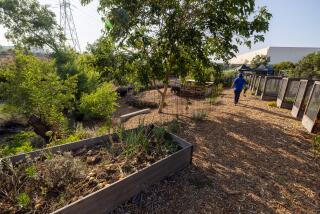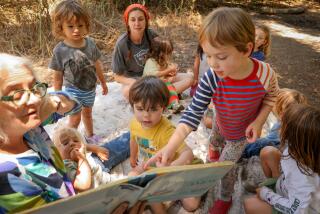Keeping the Mind From Going on Summer Vacation : Daily Activities Can Be Opportunities to Get Kids Tuned Up for September
- Share via
Linda Purrington easily transforms her backyard patio into a math classroom.
While her nieces and nephew splash in the pool, the El Morro Elementary School principal casually explains water volume and temperature scales--turning schoolbook math into something tangible and fun. A chaise longue offers a lesson in horizontal and vertical lines.
Even simple conversation--in most cases the kids’ battery of inquiries into the mysterious mind of a real-life principal--becomes a subtle vocabulary lesson.
“Sometimes they’ll tell me, ‘You’re trying to teach me something,’ ” Purrington said, laughing. “But learning is natural for kids whether you’re purposely trying to teach them or not.”
Summer vacation is a much-needed break from the classroom routine. But when the break is complete, the lessons of the past year easily fade from memory. As the new school year begins, many teachers find themselves losing the first few weeks to a review of the basics, forgotten amid the sunny beach days and video games.
Just like muscles, a child’s mind needs exercise to stay in shape, many educators say.
“Kids’ natural curiosity must be fed,” Purrington said. “If not, they get in trouble.”
Summer learning doesn’t have to be hard on children or adults. With a little forethought, parents can turn small talk or a family vacation into something fun and educational. And library branches and some school districts offer summer reading programs aimed at showing children that reading can be a pleasure, not a chore.
The elusive goal of educators is to create “lifelong learners,” children who learn because they want to, not because they are forced to in a classroom. Since most of schooling involves what’s called extrinsic learning, done to achieve a reward such as good grades or gold stars, education experts say summer is the perfect time to foster intrinsic study--learning to satisfy inner curiosity and for the pure fun of it.
Intrinsic learners are more likely to be become lifelong learners.
“What we’re trying to do is develop more intrinsic learning. You do it because it comes naturally,” said Myron Dembo, a professor of educational psychology at USC. “It’s not just getting people to get through one class. They know how to learn by themselves. That’s the key.”
The idea is to foster children’s natural curiosity through everyday events and special activities.
“You go on a trip, you stop at a park,” Dembo said. “Look at the trees and the flowers. Find a book on them. There are just so many opportunities for parents to relate experience into learning.”
More examples: A math refresher can be as simple as letting small children pay for things and count the change at stores. A teenage driver can get a mini-lesson in math and economics by calculating the price of gas versus how many miles per gallon the family car gets on a trip to the mall. Both examples teach basic math--and responsibility, Purrington said.
For parents with less time, most libraries offer summer reading programs. Again, the goal is to foster good learning habits by steering children to fun books for their age group that aren’t required reading at school.
Lynn Eisenhut, coordinator of children’s services with the Orange County Public Library system, said that while there is a common theme--this year it’s “The Worldwide Web of Learning”--each library branch does something a little different. Last week, children in Westminster learned origami while “Rudy’s Radical Science” mesmerized kids in Laguna Niguel.
The only rule is that participants somehow relate the experience to books.
“The whole purpose of this is to get kids excited about reading,” Eisenhut said. “For example, if we have a magician come to the library, he will tell the children how he became interested in magic by reading books.”
Schools are getting into the act too.
Students at Top of the World Elementary School in Laguna Beach were given a summer assignment to read a book and return to school with a poster about it. The posters will be displayed throughout the school. Parents also were encouraged to look into computer keyboarding programs and other educational opportunities for their children.
The Saddleback Valley Unified School District recently launched a districtwide summer reading program. All 33,000 students were sent home with a packet outlining a program that encourages parents to help their children read more books this summer. Like library programs, participants must keep a log of the books they read and are eligible for small prizes, such as savings bonds and Disneyland tickets.
“You always use reading,” said district spokeswoman Elaine Carter. “I can’t think of anything you need to be more skilled in and that you’re going to take with you for the rest of your lifetime. And, by reading, you also develop. You’re reading good grammar and good English so that very often you find yourself imitating a style or using new vocabulary.”
The trick with all summer learning is to make it fun, not forced. And to remember, it is still summer vacation.
“Kids need to relax a little just like we do when we are off our jobs,” Purrington said. “They need a change of environment. They need time to be creative.”
More to Read
Sign up for Essential California
The most important California stories and recommendations in your inbox every morning.
You may occasionally receive promotional content from the Los Angeles Times.













